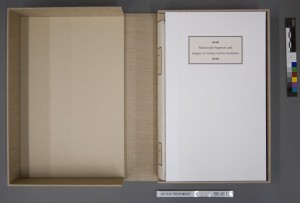The Home Stretch: Wrapping up treatment of Summerfield D544
October 24th, 2016Earlier this year, I wrote here about the treatment of Kazania na niedziele calego roku [Sermons for Sundays of the Whole Year], 1683, by Pawel Kaczyński. In those posts, I discussed the beginning and middle stages of the treatment, and at long last it is time to report on the completion of this lengthy project.
Shortly after the last post was published, I finished sewing the volume. The next steps were to round and back the book (gently hammering the book in a press to create its rounded spine and raise the shoulders along the spine), add linings to the spine, and sew endbands at the head and tail. Finally, I placed the book into a case of stiff handmade paper.
Clockwise from upper left: Completed sewing; rounding and backing the volume; a completed endband; the volume in its paper case, under weight. Click image to enlarge.
Just to rewind a little, here’s what the book looked like a year ago when it was brought to the lab:
Summerfield D544 before treatment. This is a view of the back of the volume, which had no binding, showing the fragment of manuscript pasted to the cords. The fragment is mostly concealed by layers of delaminated board.
In addition to treating the volume itself, I also cleaned, mended, and housed the manuscript fragment, written in what is thought to be Old Church Slavic, that had been used as binder’s waste on the back of the book. I did minimal stabilizing mends to this piece; the paper is fairly strong, but the media on this fragment is highly water-soluble, so I was careful to place mends very selectively so as not to disturb the fragile media. I mounted the fragment in a double-window mat, which in turn sits inside a simple mat board folio. In this folio I also included before-treatment images of the volume for researchers’ and curators’ reference, and for use in teaching.
Manuscript fragment after treatment.
The new binding for this volume is a conservation paper case. It is not intended to be a historical reproduction – for we have no way of knowing how the book was originally bound – but rather an aesthetically sympathetic binding that will integrate well with its mates in the Summerfield collection, and, most importantly, can be safely handled.
Summerfield D544 after treatment, in a handmade paper case.
The finished volume and the manuscript fragment are housed together in a cloth-covered drop-spine box. It is one of the great rewards of this job to be able to return to the stacks an item that had once been inaccessible, knowing that it can now be used and enjoyed by visitors to Spencer.
Item in box.
Angela Andres
Special Collections Conservator
Conservation Services





